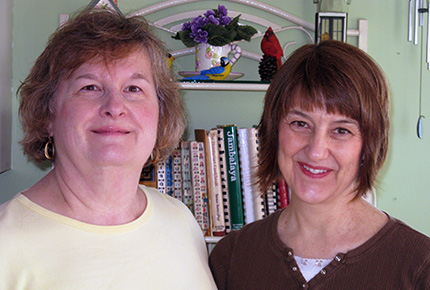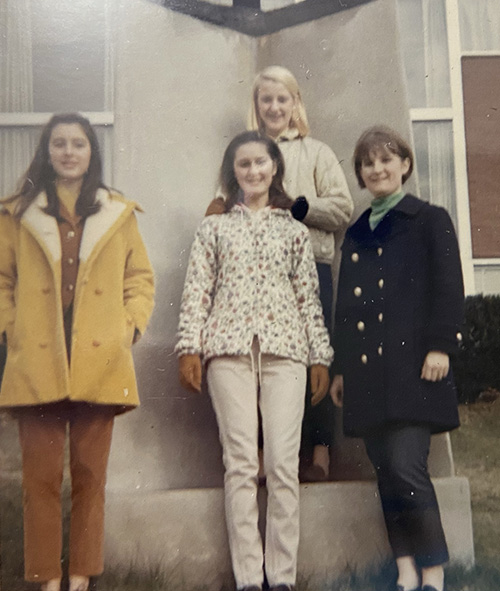- Apply
- Visit
- Request Info
- Give
Back in the Day
54 years later… Still more fun than housework
Written by Michael Stenko
Published on February 26, 2021

On a warm summer morning in September 1966, approximately 150 people gathered on the lawn outside of Shafer Hall for the first day of freshman orientation at Willimantic State College. June Roma of Trumbull and Beverly Sanford from Gilead found themselves next to each other in a long line that made its way into Shafer Auditorium, and they introduced themselves.
It was the first of many conversations that connected June (Roma) Machia ’70 and Beverly Sanford-Follis ’70 and made them best friends for life!
“When we got settled in, we didn’t know how to find each other,” said June. They were both in Burr Hall, but roommates were pre-assigned. Bev was in a converted study lounge with five other girls and June was in a regular room with three roommates. “We finally ran into each other in the dining room.” While most students went home on weekends, June and Bev always stayed on campus. It was too far for June to go home, and being around Bev was more fun, “so I stayed on campus every weekend.” Bev decided to stay on campus too. “It was a lot more fun to be with Bev than to go home and do housework,” June remembers.
Both moved their second semester, with June going just down the hall in Burr and Bev moving to what is now Winthrop Hall on the North Campus.
June remembers all the restrictions at Burr. “We had to sign out and back in again whenever we left the building, along with where we were going and who we were with. We’d be locked out if we got back after curfew, but some nights the fire escape door could be found propped open to let late girls back in! Men were only allowed in the parlor on the main floor. When a man came on any of the floors he had to yell ‘man on the floor’ . . . even the janitor! But the worst part was when the college would mail our sign out sheets back home to our parents! They questioned everything!”
Bev enjoyed life on the North Campus. “We had what was known as ‘Parietal Hours’ when men were briefly allowed to be in the building. And many of the girls living there were upper level students, so I felt pretty special.” The Student Union was in the same building and was where the action was, especially on weekends. “I worked at the snack bar, and I made every concoction imaginable that I thought would go with Coke.”

When June joined the chorus, Bev wanted to as well, but she didn’t know she had to audition. “When my turn came and I saw Dr. (Eldon) Downing, I just lost my voice, and all I heard was Dr. Downing shouting ‘next.’”
Bev joined the Outing Club and they went camping with Professor William Jahoda. They still remember James Lacey’s course “American Transcendentalism.”
“June and I were half of the class! Dr. Lacey would pile all of us into his VW Beetle and we’d go to Concord, MA, for class. Our trip to Walden Pond was really special.” Bev took a Synchronized Swimming class at the YMCA for PE credit. “I still try some of the moves from that class!”
The friends took different paths after graduation. Bev enlisted in the Air Force and was among the first women to complete the obstacle course at Lackland AFB in Texas. She served numerous positions including as assistant professor of aerospace studies and historian at Systems Command, and retired as a full colonel and command historian after 24 years of service. After leaving the Air Force, she was a librarian for a public library, retiring seven years ago. She has two children and two grandchildren.
June started her career by returning to her hometown of Trumbull to teach for four years, but left for 10 years to raise her family. When the principal found her volunteering at her son’s school, he hired her as a part-time paraprofessional. She eventually worked as a full-time paraprofessional for 25 years. She is married and has a son and daughter and two granddaughters. “It’s so ironic that Bev and I are both at home now helping teach our grandchildren with their distance learning. It’s a lot of work, but we both love it!”
Bev credits June with keeping their friendship going in the early years. “June always wrote to me, even though I wasn’t always very good at writing back.” June says that staying connected wasn’t always easy. “There was always a change of address. Bev moved 18 times, and even had to miss my wedding.” But when Bev was transferred to Washington, DC, June and her family went to visit. And when Bev retired and settled in Massachusetts, their friendship deepened.
“June wanted to revisit the Big E, something that she did for the first time when my sisters and I took her in 1966.” A trip to the Finger Lakes followed when Bev’s daughter was studying at Ithaca College, and then a two-week, 2,500-mile tour of national parks. As soon as the pandemic is under control, they will have a rescheduled trip to Ireland and Northern France. They text nearly every week.
They both agree that Eastern had a huge influence on their lives. June says, “Eastern gave me confidence to be a teacher. I had to student teach twice and was exposed to a diverse group of students under the watch of very good supervising teachers.”
Bev notes that Eastern really opened doors to the world for her. “I was painfully shy, but I developed a sense of adventure and an appreciation for what we can learn from other cultures.” She mentions Pedro Rivas and his class “Societies in Transition.” “He took us to these tiny Puerto Rican restaurants on the side streets of Willimantic just so we could experience the food, the language and the culture.”
Recalling the day they met, June says, “We just started a random conversation that morning while we were waiting for orientation to start. We didn’t even realize we were best friends until long after college, but I guess it’s no surprise that here we are, 54 years later, still talking.”


